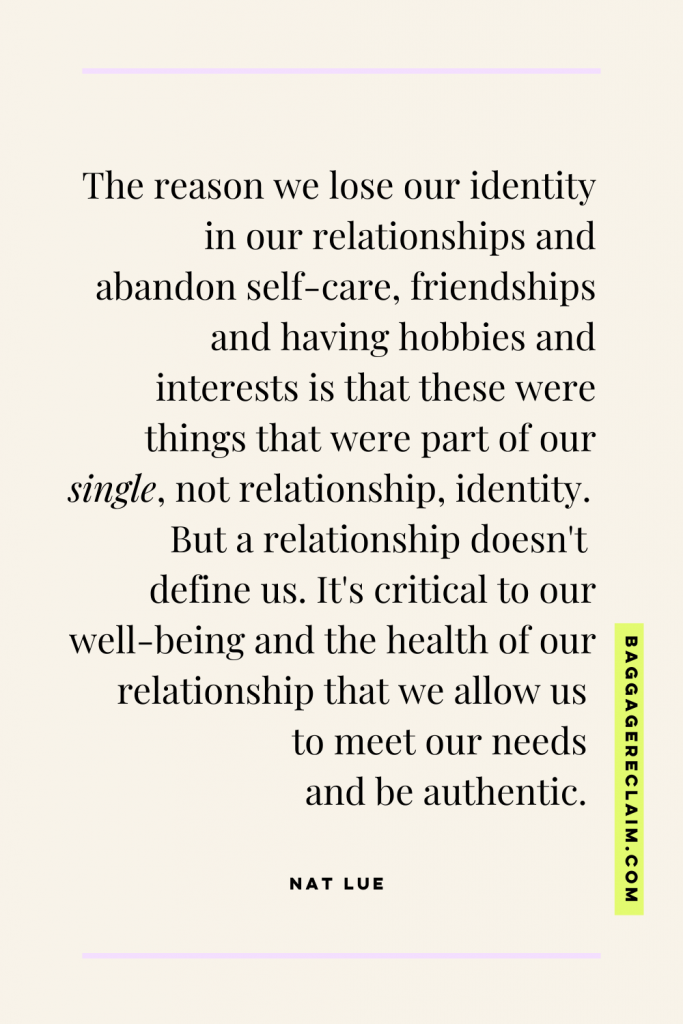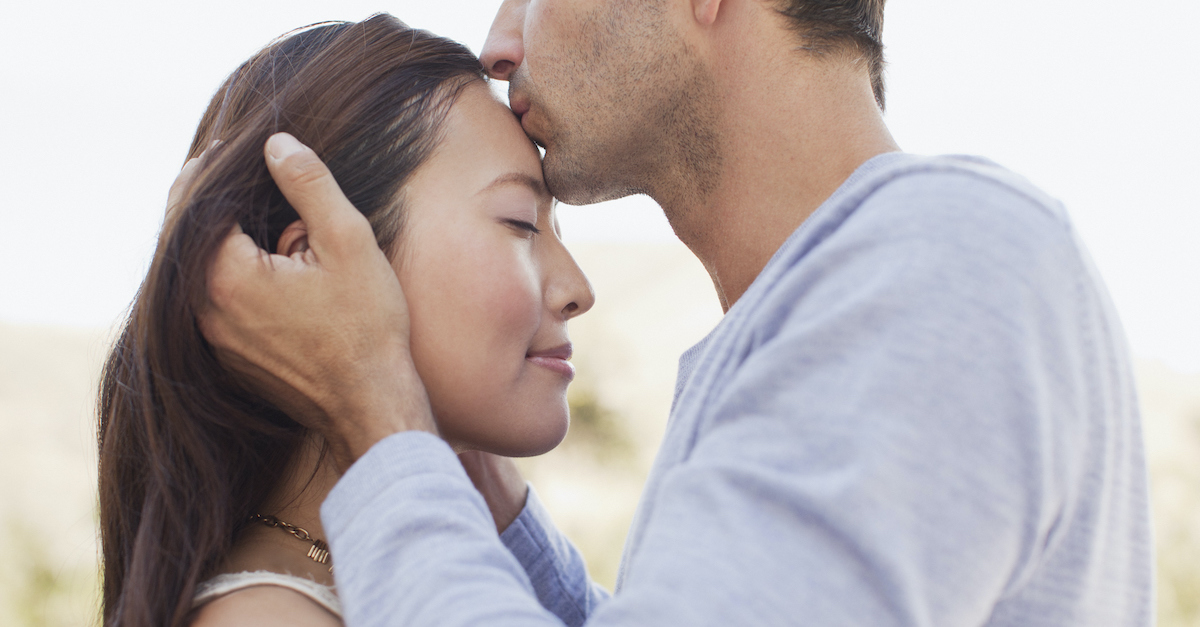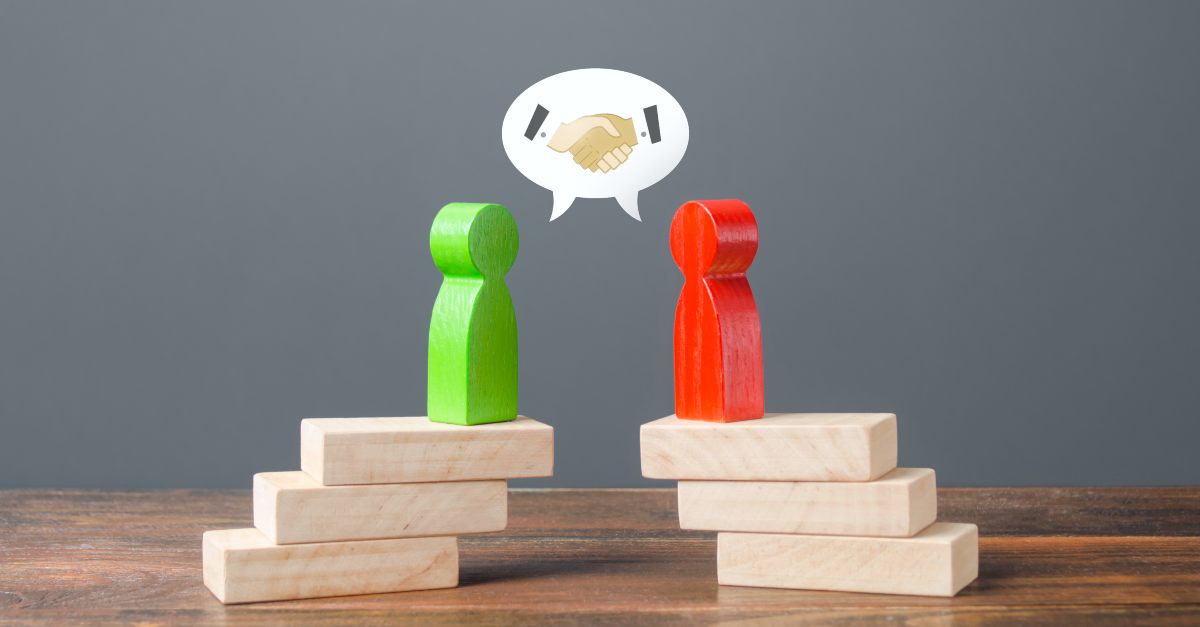The 2 Big Reasons We Lose Ourselves in Relationships
It's not uncommon at the start of a relationship to get caught up in the honeymoon period trying to spend every free moment with our new boo. For some of us, the honeymoon period sets in and gives way to revealing ourselves even more and integrating, for example, friends, family and interests. And for some, it's like we don't have the time and space for anything other than the relationship, and so we get lost.
The first few times this happens, we think it's cute and a sign of our dedication. We might not see it as a problem that we are subsumed by our relationships. Over time, however, our codependency weighs on our well-being and the relationship.
Even though we are in what could be a romantic relationship, our habit of losing our identity fosters anxiety, overwhelm, and resentment. And what's so frustrating is seeing yourself do it. Yet we often feel helpless to stop and feel guilty for putting our needs first.
There are two primary reasons from which all the others derive:
We cultivated friendships, hobbies, interests, a way of life, which served our identity when we were single. We play the role of the good girlfriend/boyfriend/partner/husband, and then become subsumed by our partner and the relationship.When we have been socialized and conditioned to believe that the pinnacle of success is to be in a romantic relationship, we are very likely to lose our identity once we are there. Our idea of who we are or are not will be based to a large extent on our relationship.
Many humans consciously and unconsciously cultivate friendships, hobbies, etc., that are only really considered important when they are single. Why? Because these are their primary source of social connection and playtime. These are activities and people they spend more time with because they are not in a relationship.
If we only are, do, and prioritize certain things when we are single, we will change identities upon entering a relationship.Farewell to hanging out with friends; tooodle-oo to the practice of self-care, including meeting our needs; sayonara maintaining our interests and hobbies.
We will shift gears to being, doing, and prioritizing everything we associate with being in a relationship. Now it's about hanging out with our partner or indulging ourselves with his family and social circle. We like what they like.
Even though it may seem like we're jumping into our relationship, we're also driven by fear and anxiety. It is the fear of being alone, that this person changes his mind about us, and the conflicts and criticism. We also have a deathly fear of messing things up, which is why we try to be the perfect person.
While we may not be consciously aware of all these concerns, our change of identity is the calling card of fear. Becoming subsumed by the relationship, however, triggers anxiety that will increase as we ignore and deprioritize ourselves. We have become detached and distanced from who we really are.
We can't play roles and enjoy intimacy and satisfied needs at the same time.It's easy to misinterpret our relational habit of losing ourselves as something "good". We might sincerely believe that we are and do what it takes to be in a relationship. A lot of people think that getting lost is how you "catch and keep" someone.
What we may not necessarily be aware of, however, is how much our mindset, behavior, and attitude reflect what we have internalized about what it means to be a good girlfriend/boyfriend/partner /husband. In playing these roles then, it is impossible for us to be limited. We inadvertently favor a codependent relationship instead of an interdependent relationship so that we don't know where we end and the other person begins.
It's easy to assume that we only lose ourselves when we're in an unhealthy relationship with an abusive partner. If, however, our default setting is what people like, we will feel compelled to lose our identity. Yes, that's even if we're with someone who wouldn't feel remotely threatened by us being ourselves.
It's no wonder we lose our identity in romantic relationships when...

It's not uncommon at the start of a relationship to get caught up in the honeymoon period trying to spend every free moment with our new boo. For some of us, the honeymoon period sets in and gives way to revealing ourselves even more and integrating, for example, friends, family and interests. And for some, it's like we don't have the time and space for anything other than the relationship, and so we get lost.
The first few times this happens, we think it's cute and a sign of our dedication. We might not see it as a problem that we are subsumed by our relationships. Over time, however, our codependency weighs on our well-being and the relationship.
Even though we are in what could be a romantic relationship, our habit of losing our identity fosters anxiety, overwhelm, and resentment. And what's so frustrating is seeing yourself do it. Yet we often feel helpless to stop and feel guilty for putting our needs first.
There are two primary reasons from which all the others derive:
We cultivated friendships, hobbies, interests, a way of life, which served our identity when we were single. We play the role of the good girlfriend/boyfriend/partner/husband, and then become subsumed by our partner and the relationship.When we have been socialized and conditioned to believe that the pinnacle of success is to be in a romantic relationship, we are very likely to lose our identity once we are there. Our idea of who we are or are not will be based to a large extent on our relationship.
Many humans consciously and unconsciously cultivate friendships, hobbies, etc., that are only really considered important when they are single. Why? Because these are their primary source of social connection and playtime. These are activities and people they spend more time with because they are not in a relationship.
If we only are, do, and prioritize certain things when we are single, we will change identities upon entering a relationship.Farewell to hanging out with friends; tooodle-oo to the practice of self-care, including meeting our needs; sayonara maintaining our interests and hobbies.
We will shift gears to being, doing, and prioritizing everything we associate with being in a relationship. Now it's about hanging out with our partner or indulging ourselves with his family and social circle. We like what they like.
Even though it may seem like we're jumping into our relationship, we're also driven by fear and anxiety. It is the fear of being alone, that this person changes his mind about us, and the conflicts and criticism. We also have a deathly fear of messing things up, which is why we try to be the perfect person.
While we may not be consciously aware of all these concerns, our change of identity is the calling card of fear. Becoming subsumed by the relationship, however, triggers anxiety that will increase as we ignore and deprioritize ourselves. We have become detached and distanced from who we really are.
We can't play roles and enjoy intimacy and satisfied needs at the same time.It's easy to misinterpret our relational habit of losing ourselves as something "good". We might sincerely believe that we are and do what it takes to be in a relationship. A lot of people think that getting lost is how you "catch and keep" someone.
What we may not necessarily be aware of, however, is how much our mindset, behavior, and attitude reflect what we have internalized about what it means to be a good girlfriend/boyfriend/partner /husband. In playing these roles then, it is impossible for us to be limited. We inadvertently favor a codependent relationship instead of an interdependent relationship so that we don't know where we end and the other person begins.
It's easy to assume that we only lose ourselves when we're in an unhealthy relationship with an abusive partner. If, however, our default setting is what people like, we will feel compelled to lose our identity. Yes, that's even if we're with someone who wouldn't feel remotely threatened by us being ourselves.
It's no wonder we lose our identity in romantic relationships when...
What's Your Reaction?















![Three of ID's top PR executives quit ad firm Powerhouse [EXCLUSIVE]](https://variety.com/wp-content/uploads/2023/02/ID-PR-Logo.jpg?#)







